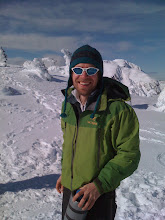A new group set up by Gov. Sarah Palin to address climate change is forging a relationship with the University of Alaska to help the state place infrastructure, manage fish and game, and otherwise understand and deal with expected changes.
Environmental Conservation Commissioner Larry Hartig said last week the university’s new Scenarios Network for Alaska Planning program could help the state plan new buildings and roads by providing detailed, localized projections of various changes, including permafrost degradation and erosion. It could also help the state’s Department of Fish and Game understand the expected impacts of warming water temperatures on salmon and other species, he said.
The network, which was officially launched in March, is aimed at tailoring new research to the needs of state and local governments, nongovernmental organizations, and industry, and making existing university research more accessible.
The governor’s new subcabinet on climate change discussed the university program and other issues at its first meeting May 22 in Anchorage.
“I’m pretty excited about the relationship between the university and the subcabinet,” Hartig, the group’s chair, said.
The subcabinet consists of the commissioners of the departments of Environmental Conservation, Fish and Game, Natural Resources, Commerce, and Transportation; Palin’s representative in Washington, D.C.; and a representative of the University of Alaska.
Scott Rupp, an associate professor of forest sciences at the University of Alaska Fairbanks and director of the university program, also expressed enthusiasm for the new relationship with the state.
The university has done important research on changes in North Slope vegetation, permafrost thawing, and the effects of warming on wildfires, he said, “But to this point… I don’t think the science community has necessarily done a great job reaching out to the communities, the state, [and] decision-makers.”
Rupp said research funding often ran out before the research findings could be communicated to stakeholders.
The new program is funded by a $1.5 million investment by the university, but Rupp said program directors would seek additional support from research funders for specific projects.
One of the group’s first projects will be to localize a handful of climate models projecting global changes. Rupp said the network is shooting for specific projections that can show likely changes in areas as small as a few square miles, instead of the hundreds of square miles in global projections.
“We will have a set of future climate data at a resolution that we’ve never had before,” he said.
Buck Sharpton, UAF’s vice chancellor for research and a member of the new subcabinet, described the network as one element of a bridge between the state and its university. He said the university was in a position to provide key data, especially with the emphasis on the arctic from the International Polar Year.
Sharpton and Hartig both said the subcabinet was off to a good start but faced with a somewhat daunting task.
The group’s mission largely mimics that of the Alaska Climate Impact Assessment Commission, which was established last year by the Legislature to review impacts, including any positive ones, and recommend solutions.
But the subcabinet’s goal extends beyond the commission’s to include efforts to stop the changes from happening in the first place or limit their extent. Hartig said his department was refining an inventory of in-state greenhouse gas emissions as the first step toward reducing state emissions. The subcabinet will track relevant federal legislation and review various state and regional initiatives to reduce emissions.
Hartig said the subcabinet hasn’t set its next meeting date but plans to meet about once a month over the summer. Cabinet meetings aren’t typically public, and the subcabinet’s meetings won’t be either, but Hartig said he anticipated public hearings because of the broad interest in the issue.
He added that the subcabinet may form work groups with public members to take advantage of local knowledge on specific issues.
The climate impact commission is scheduled to meet in Kotzebue in late June.

No comments:
Post a Comment